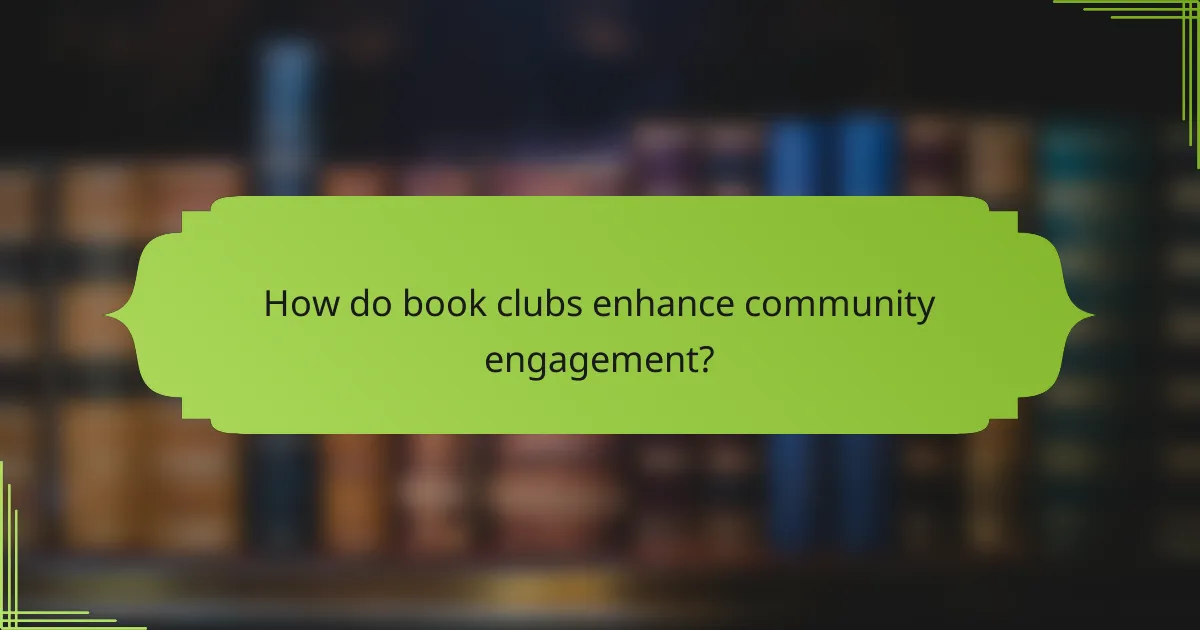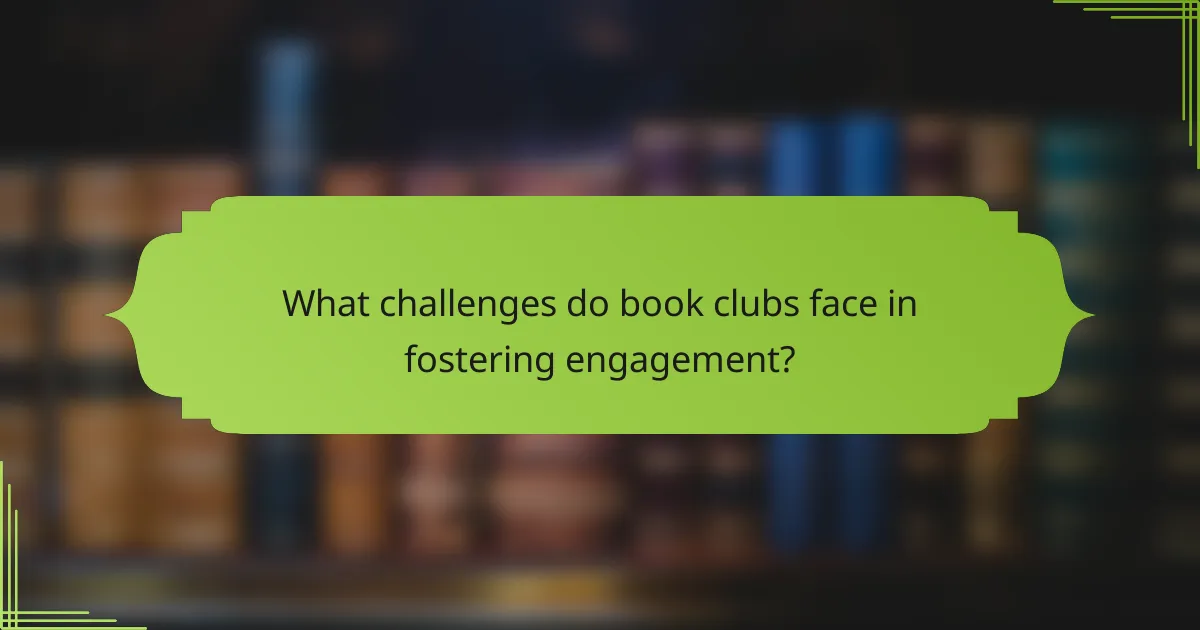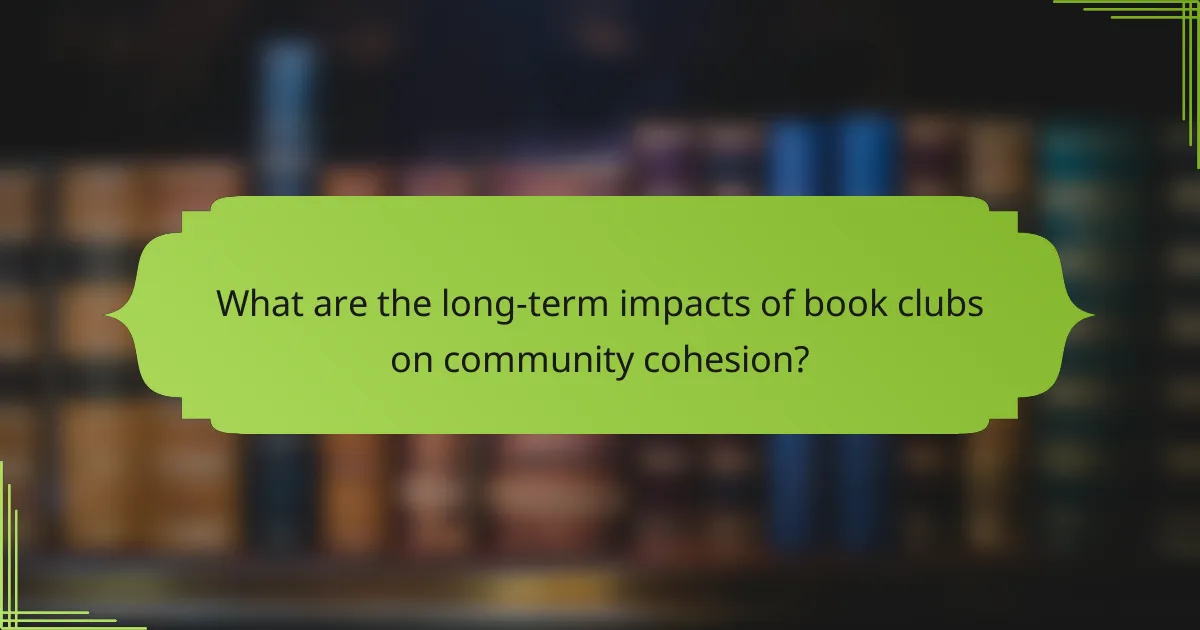Book clubs enhance community engagement by fostering connections among diverse individuals. They promote shared discussions, improve critical thinking, and support local authors. Additionally, technology facilitates communication and broadens access, enriching the reading experience. These groups also address challenges in maintaining member engagement, ensuring meaningful interactions and personal growth.

How do book clubs enhance community engagement?
Book clubs significantly enhance community engagement by fostering connections among members. They create a space for shared experiences, discussions, and diverse perspectives. This interaction strengthens social bonds and encourages collaboration within the community. Studies show that participants in book clubs report increased feelings of belonging and community involvement. Additionally, book clubs often support local libraries and authors, further enriching the cultural landscape.
What social connections are fostered through book clubs?
Book clubs foster diverse social connections, enhancing community engagement. They create a sense of belonging through shared interests in literature. Participants often form friendships, exchange ideas, and develop empathy by discussing various perspectives. This collaborative environment encourages networking and strengthens local ties, promoting a supportive community atmosphere.
Which community issues can be addressed through literary discussions?
Literary discussions can address community issues such as social isolation, cultural awareness, and empathy development. Book clubs foster connections among diverse groups, enhancing communication and understanding. They can also promote literacy and critical thinking, empowering individuals to engage in civic matters. As a result, literary journeys create a platform for dialogue, addressing both local and global challenges.

What are the educational benefits of participating in book clubs?
Participating in book clubs enhances educational benefits through improved critical thinking and communication skills. Members engage in discussions that deepen comprehension and foster diverse perspectives. This collaborative learning environment encourages members to analyze texts more thoroughly. Additionally, book clubs often introduce participants to new genres and authors, broadening literary horizons and stimulating a love for reading.
How do book clubs promote literacy and critical thinking?
Book clubs enhance literacy and critical thinking through collaborative discussions and diverse reading selections. Members engage in deep analysis, improving comprehension and interpretation skills. Studies show that participation in book clubs increases vocabulary and fosters a love for reading. Additionally, the social aspect encourages open-mindedness and appreciation for different perspectives.
Which age groups benefit most from book club participation?
All age groups can benefit from book club participation, but specific groups gain unique advantages.
Younger adults, particularly those in their 20s and 30s, often seek social connections and networking opportunities, which book clubs provide. Middle-aged participants, typically in their 40s and 50s, benefit from intellectual engagement and discussions that stimulate critical thinking. Seniors, often 60 and above, enjoy the social interaction and mental stimulation that reading and discussing books offer, contributing to cognitive health.
Book clubs foster a sense of community across these age groups, encouraging diverse perspectives and enriching social bonds. Each group experiences distinct benefits, making book clubs valuable for all ages.

What unique experiences do book clubs offer to participants?
Book clubs offer unique experiences that foster community engagement through shared discussions and diverse perspectives. Participants develop deeper connections with literature and one another, enhancing social bonds and empathy. Engaging with various genres exposes members to different cultures and ideas, promoting a broader worldview. Additionally, book clubs often provide a safe space for expressing thoughts and feelings, encouraging open dialogue and personal growth.
How do themed book clubs cater to specific interests and demographics?
Themed book clubs effectively cater to specific interests and demographics by curating reading selections that resonate with members. These clubs create a sense of belonging and enhance community engagement. For instance, a mystery-themed club attracts enthusiasts of thrillers, while a genre-specific club can foster discussions among fans of fantasy or historical fiction.
Additionally, themed book clubs can address unique attributes, such as cultural backgrounds or shared experiences, making them appealing to diverse groups. This approach not only enriches the reading experience but also promotes social interaction and understanding among members. As a result, participants often report increased satisfaction and a stronger connection to their community.
What role do local authors play in enhancing book club experiences?
Local authors significantly enhance book club experiences by providing unique insights and fostering community connections. Their familiarity with local culture enriches discussions and makes literature more relatable. Engaging with authors during book club meetings encourages deeper exploration of themes and character motivations. This interaction often leads to a stronger sense of community, as members share personal experiences tied to the local context. Additionally, local authors may offer exclusive content, such as unpublished works or behind-the-scenes stories, further enhancing the value of the book club experience.

What challenges do book clubs face in fostering engagement?
Book clubs often struggle with maintaining consistent engagement among members. Key challenges include varying reading preferences, scheduling conflicts, and differing levels of commitment. These factors can hinder meaningful discussions and diminish the overall experience. Additionally, some members may feel intimidated or reluctant to share their thoughts, impacting group dynamics. Addressing these challenges requires thoughtful planning and open communication to foster a more inclusive and engaging environment.
How can book clubs overcome membership retention issues?
Book clubs can enhance membership retention by fostering a sense of community and engagement. Regular meetings that encourage open discussions create strong bonds among members. Incorporating themed events or guest speakers can also attract interest and participation. Additionally, soliciting member feedback helps tailor activities to their preferences, ensuring everyone feels valued. Engaging in community service projects can further strengthen connections and provide shared goals.
Which strategies can book clubs implement to attract diverse participants?
Book clubs can attract diverse participants by implementing inclusive programming and outreach strategies. They should curate a selection of books that reflect various cultures and perspectives. Hosting events that celebrate different literary traditions can foster engagement. Collaborating with community organizations can enhance visibility and reach underrepresented groups. Additionally, utilizing social media platforms to promote events can attract a wider audience.

How can technology transform book club experiences?
Technology can significantly enhance book club experiences by facilitating communication and expanding access. Virtual platforms enable members to connect regardless of location, fostering a broader community. Digital tools, such as discussion forums and social media, encourage ongoing engagement and idea exchange. This connectivity allows for diverse perspectives, enriching discussions and deepening understanding of literary works. Additionally, technology provides access to a wider array of resources, including audiobooks and e-books, catering to various preferences and enhancing the reading experience.
What virtual formats are popular among modern book clubs?
Popular virtual formats among modern book clubs include video conferencing, social media groups, and dedicated book club apps. Video conferencing platforms like Zoom foster real-time discussions, while social media groups on Facebook or Goodreads facilitate ongoing engagement. Book club apps offer curated reading lists and discussion prompts, enhancing the overall experience. These formats promote community engagement and inclusivity, allowing members to connect regardless of location.
Which digital tools enhance communication and organization within book clubs?
Digital tools that enhance communication and organization within book clubs include platforms like Goodreads, Zoom, and Slack. These tools facilitate discussions, schedule meetings, and share reading lists effectively. Goodreads allows users to track books and engage in discussions, while Zoom supports virtual meetings for remote members. Slack provides channels for ongoing conversations and updates. Together, they strengthen community engagement and streamline the book club experience.

What are the long-term impacts of book clubs on community cohesion?
Book clubs significantly enhance community cohesion by fostering connections among diverse individuals. They create a shared space for dialogue, encouraging empathy and understanding. Participants often report increased social ties, leading to stronger community networks. Research indicates that regular engagement in book clubs can reduce feelings of isolation and enhance overall well-being. Additionally, these groups often promote local authors and cultural events, further enriching community ties.
How do book clubs influence local culture and identity?
Book clubs significantly influence local culture and identity by fostering community connections and promoting shared literary experiences. They create spaces for dialogue, allowing diverse voices to be heard and appreciated. This engagement enhances cultural awareness and strengthens community bonds. For instance, book clubs often select works that reflect local history or social issues, encouraging discussions that shape collective identity. Moreover, they can introduce members to new perspectives, enriching the cultural fabric of the community.
What evidence exists to support the benefits of book clubs in community settings?
Book clubs enhance community engagement through social interaction, shared learning, and cultural exchange. Research indicates that participants report increased empathy and improved communication skills. A study found that 75% of members felt more connected to their community after joining a book club. Additionally, book clubs can stimulate local economies by encouraging visits to libraries and bookstores. These activities foster a sense of belonging and promote lifelong learning, making book clubs valuable community assets.
What best practices can book clubs adopt for successful engagement?
Book clubs can enhance engagement by fostering open discussions, selecting diverse reading materials, and creating a welcoming atmosphere. Establishing regular meeting schedules and incorporating themed events can also strengthen community ties. Encouraging member participation through book selections and feedback promotes a sense of ownership.